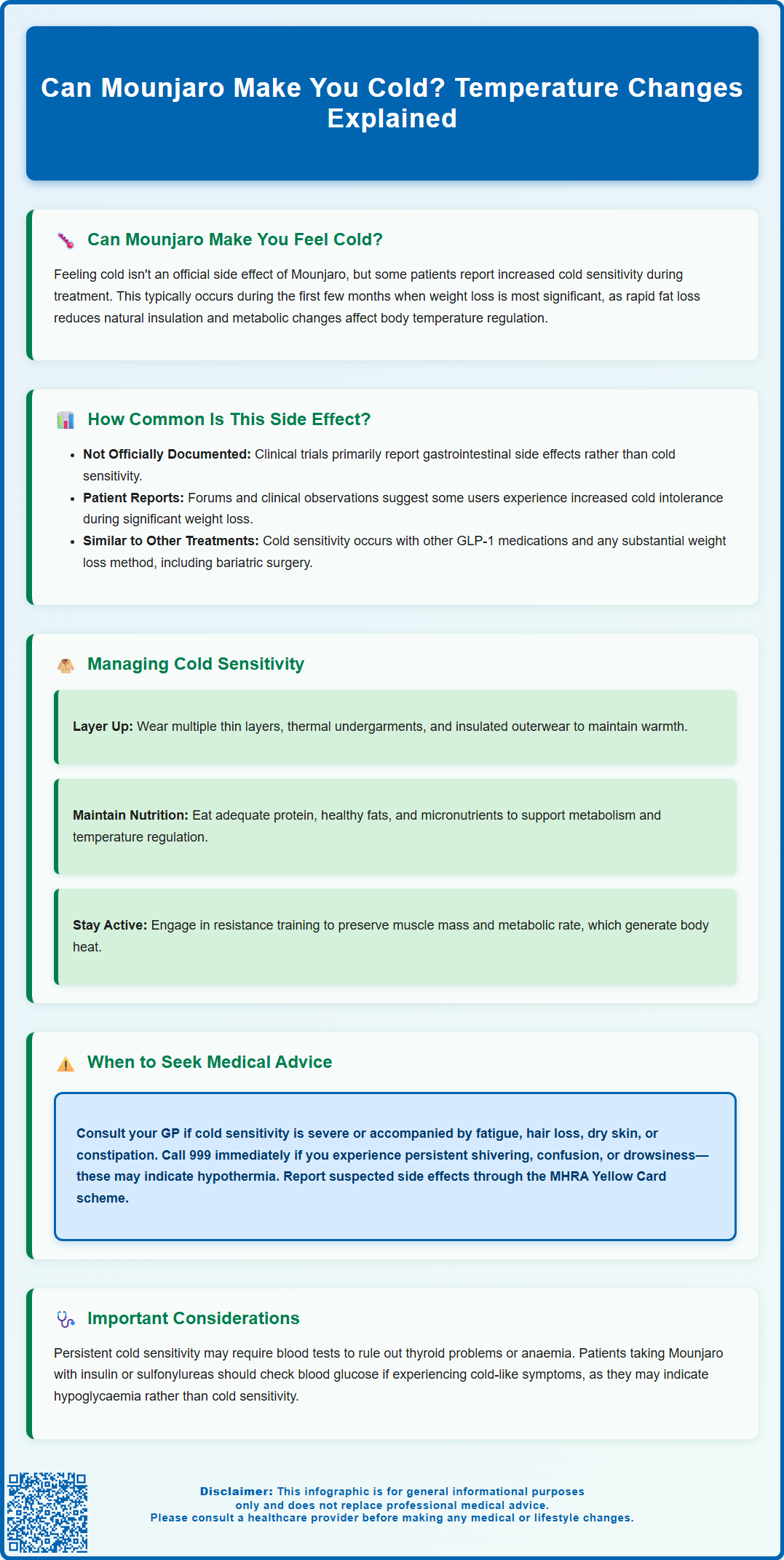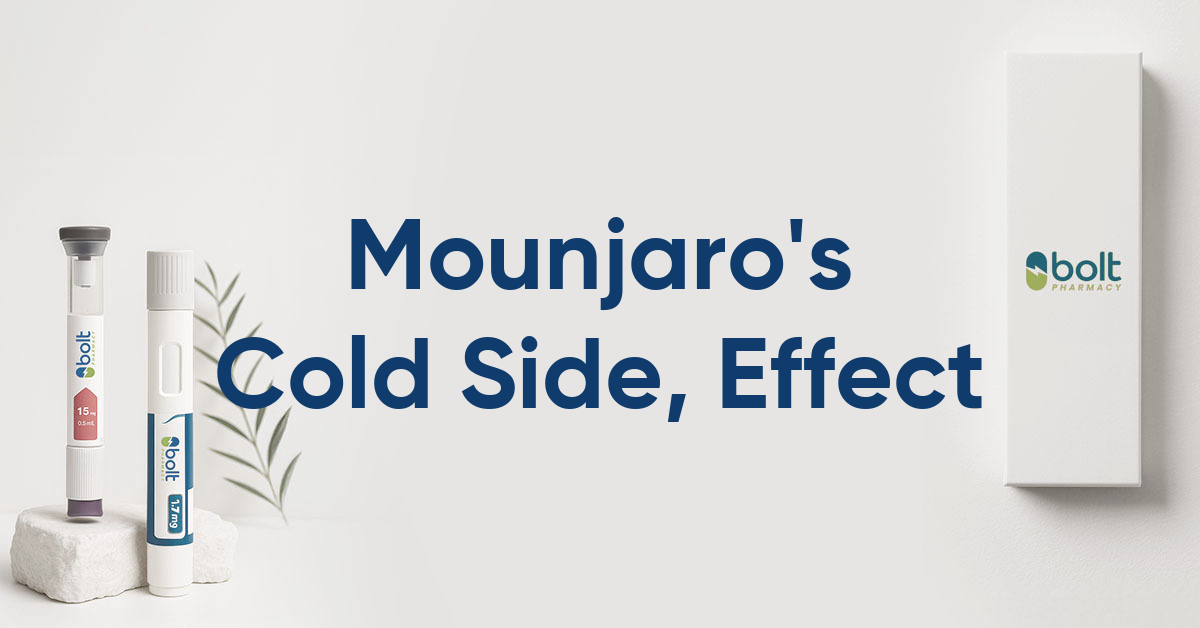Mounjaro (tirzepatide) is a GLP-1 and GIP receptor agonist licensed in the UK for type 2 diabetes and weight management. Whilst feeling cold is not listed as an official adverse reaction in the Summary of Product Characteristics, some patients report increased cold sensitivity during treatment. This phenomenon appears linked to rapid weight loss, reduced subcutaneous fat, and metabolic changes rather than a direct pharmacological effect. Understanding the potential causes and management strategies can help patients maintain comfort whilst benefiting from Mounjaro therapy.
Summary: Mounjaro (tirzepatide) is not officially associated with cold sensitivity, but some patients report feeling colder due to rapid weight loss and reduced subcutaneous fat rather than direct drug effects.
- Tirzepatide is a dual GLP-1/GIP receptor agonist licensed for type 2 diabetes and weight management in the UK.
- Cold sensitivity is not listed in the MHRA-approved prescribing information or clinical trial safety data.
- Rapid weight loss reduces subcutaneous fat insulation and may alter thermoregulation and metabolic rate.
- Similar cold sensitivity occurs with other weight-loss interventions, suggesting a body composition rather than drug-specific cause.
- Persistent cold intolerance warrants thyroid function tests and full blood count to exclude hypothyroidism or anaemia.
- Patients taking Mounjaro with insulin or sulfonylureas should check blood glucose if experiencing cold-like symptoms that may indicate hypoglycaemia.
Table of Contents
Can Mounjaro Make You Feel Cold?
Mounjaro (tirzepatide) is a glucagon-like peptide-1 (GLP-1) and glucose-dependent insulinotropic polypeptide (GIP) receptor agonist licensed in the UK for the treatment of type 2 diabetes mellitus and, more recently, for weight management in adults with obesity or overweight with weight-related comorbidities as an adjunct to reduced-calorie diet and increased physical activity. Feeling cold is not listed as an adverse reaction in the official Summary of Product Characteristics (SmPC) or MHRA-approved prescribing information, though some patients report experiencing increased cold sensitivity during treatment.
The mechanism behind this phenomenon is not established through clinical trials, but several physiological factors may contribute. Rapid weight loss, which commonly occurs with Mounjaro therapy, can lead to a reduction in subcutaneous fat—a natural insulator that helps maintain body temperature. Additionally, metabolic changes associated with caloric restriction and altered energy expenditure may influence thermoregulation. Some patients report feeling colder particularly during the initial months of treatment when weight loss is most pronounced.
It is important to note that there is no official link confirmed by regulatory authorities between tirzepatide and cold intolerance as a direct pharmacological effect. However, the indirect consequences of treatment—including reduced caloric intake, changes in body composition, and potential nutritional deficiencies—may collectively contribute to altered temperature perception. Patients experiencing persistent or severe cold sensitivity should discuss this with their healthcare provider to rule out other underlying causes, such as thyroid dysfunction or anaemia, which may require investigation.
Patients taking Mounjaro alongside insulin or sulfonylureas should be aware that symptoms resembling cold sensitivity (such as shakiness or sweating) could potentially indicate hypoglycaemia, and checking blood glucose levels is advisable if these symptoms occur.
How Common Is Feeling Cold on Mounjaro?
Quantifying the prevalence of cold sensitivity among Mounjaro users is challenging, as this symptom has not been systematically recorded in pivotal clinical trials such as SURPASS or SURMOUNT studies. The most frequently reported adverse effects in these trials include gastrointestinal symptoms—nausea, diarrhoea, vomiting, constipation, and abdominal discomfort—which affect a substantial proportion of patients, particularly during dose escalation. Cold intolerance does not feature in the tirzepatide SmPC or in these safety datasets.
Nevertheless, anecdotal reports from patient forums, social media groups, and clinical observations suggest that some individuals do experience increased sensitivity to cold temperatures whilst taking tirzepatide. This appears to be more noticeable during periods of significant weight loss and often coincides with periods of rapid fat mass reduction.
Comparative context is useful here: similar anecdotal reports of cold sensitivity have been noted with other GLP-1 receptor agonists, such as semaglutide (Ozempic, Wegovy), and are well-recognised in patients undergoing substantial weight loss through any means—whether pharmacological, surgical (bariatric procedures), or dietary intervention. This suggests the phenomenon is likely related to the metabolic and body composition changes associated with weight reduction rather than a specific pharmacological property of tirzepatide itself. Healthcare professionals should be aware of this potential concern when counselling patients, even though it remains outside the formal adverse event profile.

Managing Cold Sensitivity While Taking Mounjaro
Practical strategies can help patients manage cold sensitivity effectively without compromising treatment efficacy. Firstly, layering clothing appropriately is essential—wearing multiple thin layers allows better insulation and flexibility to adjust to varying indoor and outdoor temperatures. Thermal undergarments, warm socks, and insulated outerwear can significantly improve comfort, particularly during colder months.
Maintaining adequate nutrition is crucial. Patients on Mounjaro often experience reduced appetite, which may lead to insufficient caloric intake. Ensuring a balanced diet with adequate protein, healthy fats, and micronutrients supports metabolic function and thermoregulation. A registered dietitian can provide tailored guidance for individuals struggling with appetite suppression. Nutritional supplements should only be taken if deficiencies are confirmed through testing or specifically recommended by a healthcare professional.
Regular physical activity helps maintain muscle mass and metabolic rate, both of which contribute to heat generation. Resistance training is particularly beneficial for preserving lean body mass during weight loss, in line with UK Chief Medical Officers' physical activity guidelines. Additionally, staying well-hydrated and consuming warm beverages throughout the day can provide comfort and support circulation.
Environmental adjustments at home and work—such as using space heaters, heated blankets, or adjusting central heating—can create a more comfortable ambient temperature. When using heating devices, follow manufacturer safety instructions to avoid burns or other injuries. Patients should also be mindful of sudden temperature changes and dress appropriately when moving between heated indoor spaces and cold outdoor environments.
If cold sensitivity persists or worsens despite these measures, patients should consult their GP or prescribing clinician. Investigations may include thyroid function tests (TSH, free T4), full blood count, ferritin, vitamin B12 and folate levels to exclude hypothyroidism or anaemia, both of which can cause cold intolerance and may require specific treatment.
For patients taking Mounjaro alongside insulin or sulfonylureas, it's important to check blood glucose levels if experiencing symptoms that could indicate hypoglycaemia, as these can sometimes be confused with cold sensitivity.
When to Seek Medical Advice About Temperature Changes
Whilst mild cold sensitivity during weight loss is generally benign, certain red flag symptoms warrant prompt medical evaluation. Patients should contact their GP or healthcare provider if they experience:
-
Severe or progressive cold intolerance that significantly impairs daily activities or quality of life
-
Unexplained fatigue, weakness, or lethargy accompanying cold sensitivity, which may suggest thyroid dysfunction
-
Hair loss, dry skin, constipation, or cognitive changes—additional features of hypothyroidism
-
Pallor, dizziness, shortness of breath, or palpitations—potential indicators of anaemia
-
Unintentional weight loss exceeding clinical expectations or signs of malnutrition
For more urgent symptoms, seek immediate medical attention (call 999 or attend A&E) if experiencing:
- Persistent shivering, confusion, slurred speech, or drowsiness—possible signs of hypothermia requiring urgent assessment
Investigations for persistent cold sensitivity should be guided by symptoms and clinical judgement. These may include thyroid function, full blood count, ferritin, vitamin B12 and folate levels, particularly in patients reporting new or worsening symptoms.
Patients taking Mounjaro alongside insulin or sulfonylureas should be particularly vigilant about symptoms that could indicate hypoglycaemia (shakiness, sweating, hunger, confusion) and check their blood glucose if these occur.
Patients should also report any suspected side effects through the MHRA Yellow Card scheme (yellowcard.mhra.gov.uk), contributing to post-marketing surveillance and safety monitoring of tirzepatide. Healthcare professionals should maintain a low threshold for investigation when patients report persistent temperature-related symptoms, ensuring that treatable underlying conditions are not overlooked.
Patient safety remains paramount. Whilst Mounjaro is generally well-tolerated and effective, individualised monitoring and open communication between patients and prescribers facilitate early identification and management of any concerns, ensuring optimal therapeutic outcomes whilst minimising potential risks.
Frequently Asked Questions
Is feeling cold a recognised side effect of Mounjaro?
No, cold sensitivity is not listed as an adverse reaction in the official Summary of Product Characteristics. However, some patients report feeling colder due to rapid weight loss and reduced body fat, which are indirect consequences of treatment rather than direct drug effects.
What should I do if I feel persistently cold whilst taking Mounjaro?
Layer clothing appropriately, maintain adequate nutrition, and stay physically active to support thermoregulation. If cold sensitivity persists or worsens, consult your GP for investigations including thyroid function tests and full blood count to exclude underlying conditions such as hypothyroidism or anaemia.
When should I seek urgent medical help for temperature changes on Mounjaro?
Seek immediate medical attention (call 999 or attend A&E) if you experience persistent shivering, confusion, slurred speech, or drowsiness, as these may indicate hypothermia requiring urgent assessment.
The health-related content published on this site is based on credible scientific sources and is periodically reviewed to ensure accuracy and relevance. Although we aim to reflect the most current medical knowledge, the material is meant for general education and awareness only.
The information on this site is not a substitute for professional medical advice. For any health concerns, please speak with a qualified medical professional. By using this information, you acknowledge responsibility for any decisions made and understand we are not liable for any consequences that may result.
Heading 1
Heading 2
Heading 3
Heading 4
Heading 5
Heading 6
Lorem ipsum dolor sit amet, consectetur adipiscing elit, sed do eiusmod tempor incididunt ut labore et dolore magna aliqua. Ut enim ad minim veniam, quis nostrud exercitation ullamco laboris nisi ut aliquip ex ea commodo consequat. Duis aute irure dolor in reprehenderit in voluptate velit esse cillum dolore eu fugiat nulla pariatur.
Block quote
Ordered list
- Item 1
- Item 2
- Item 3
Unordered list
- Item A
- Item B
- Item C
Bold text
Emphasis
Superscript
Subscript












